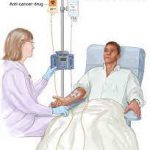Table of Contents
Why is cisplatin and docetaxel prescribed?
Docetaxel and cisplatin are a combination of two chemotherapy drugs. Docetaxel and cisplatin are beneficial to treat non-small cell lung cancer. It is also useful to treat other cancers.
Docetaxel belongs to a class of chemotherapy drugs called plant alkaloids. Cisplatin is in a class of medications known as platinum-containing compounds. These chemotherapy drugs work by destroying quickly dividing cells (cancer cells).
How should cisplatin and docetaxel be used?
Your health care provider will be give docetaxel and cisplatin in the chemotherapy day unit. A chemotherapy nurse will give it to you with other cancer drugs if needed.
Your nurse will give you anti-sickness (anti-emetic) drugs before the chemotherapy. The chemotherapy drugs can be given through:

- a short thin tube the nurse puts into a vein in your arm or hand (cannula)
- a fine tube that goes under the skin of your chest and into a vein close by (central line)
- a fine tube that is put into a vein in your arm and goes up into a vein in your chest (PICC line).
You will be given extra fluids through your drip before and after the cisplatin to protect your kidneys.
You will have a course of several cycles of treatment over a few months. Each cycle of docetaxel and cisplatin takes 21 days (3 weeks). On the first day, you will have docetaxel and cisplatin. You will then have a rest period with no chemotherapy for the next 20 days.
Before each cycle, your nurse or pharmacist will give you steroid tablets to take at home. They help prevent an allergic reaction during chemotherapy and fluid building up.
What side effects can Cisplatin and Docetaxel cause?
Cisplatin and docetaxel may cause side effects. Tell your doctor if any of these symptoms are severe or do not go away:
Infection
Bruising
Bleeding
Dizziness
SERIOUS SIDE EFFECTS
If you experience any of these symptoms, call your doctor immediately:
Kidney dysfunction
Second cancer
Eye problem
Hearing impairment
In case of emergency/overdose
Contact your doctor or nurse immediately if you have signs of infection, including a temperature above 37.5C or below 36C.
What other information should I know?
It is important for you to keep a written list of all of the prescription and nonprescription (over-the-counter) medicines you are taking, as well as any products such as vitamins, minerals, or other dietary supplements. Bring this list each time you visit a doctor. It is also important information to carry with you in case of emergencies.
